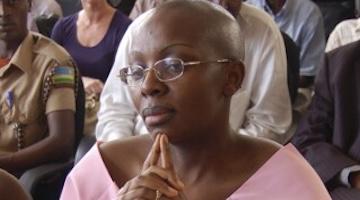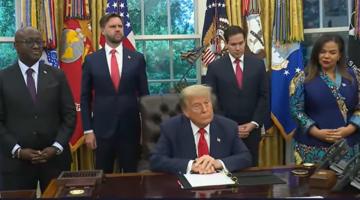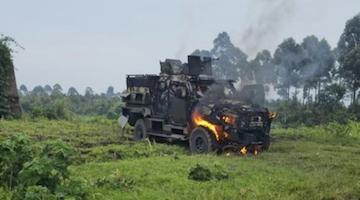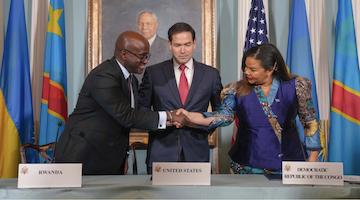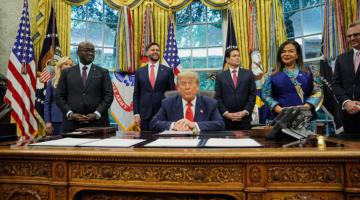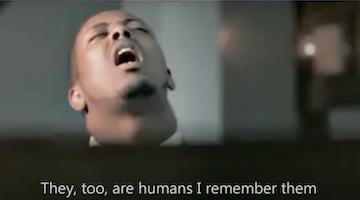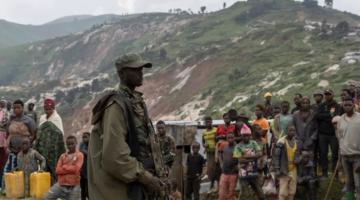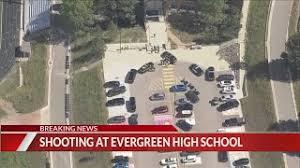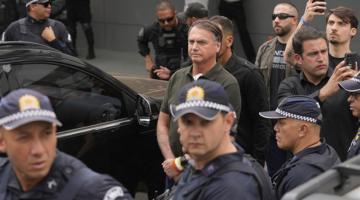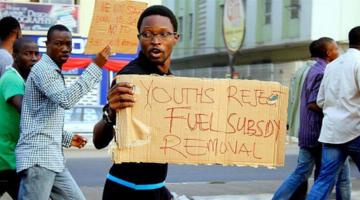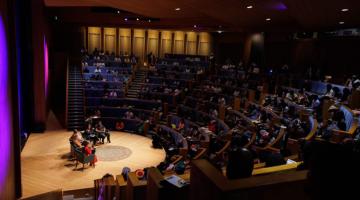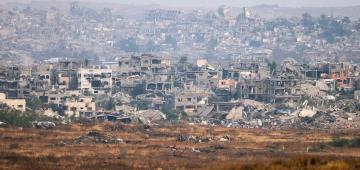Participants of the conference held in Kisangani on June 8 to commemorate the “six-day war” of June 2000. DR
Uganda and Rwanda began their incursions into the Democratic Republic of Congo 23 years ago. Full reparations to victims have not been paid and the two invader countries still act with impunity.
Originally published in Friends of the Congo.
This report refers to a sad date for the whole of the Democratic Republic of Congo. On June 5th, 2000, 23 years ago, the Democratic Republic of Congo faced a war that lasted six days from 5 to 10 June 2000 in the city of Kisangani.
Kisangani was the epicentre of an outbreak of violence by the Ugandan and Rwandan armies in support of rival local factions for the management of territories. Kisangani, the martyred city with multiple desires, could not escape the ravages of a war whose after-effects remain.
Located in the centre of the Congo Basin, the city of Kisangani is a river port at the confluence of the Lindi, Tshopo and Congo rivers. Given this strategic position, the authorities had elevated the city to the rank of regional capital, making it a major economic development pole for the country. However, this coveted regional capital has been the object of fighting between militias since the 1990s, which has severely affected the regional economy as well as the living conditions of the local civilian population, leaving the DRC government powerless.
It was on Monday, June 5th, 2000, that this war broke out. It was a high-intensity war with fighting that had its epicentre in the centre of Kisangani. This abrupt war was marked by the violation of fundamental principles of international law.
Indeed, the intervention of Rwanda and Uganda on the territory of the Democratic Republic of Congo by the regular Rwandan military forces, the Rwandan Patriotic Army (RPA) and the Uganda People's Defence Forces (UPDF) in support of local factions represented an immediate violation of the territorial integrity of Congo and contributed to the intensification of the violence of the fighting.
The occupation of Kisangani by these two foreign countries in support of local factions was strategic and totally self-serving. Their presence in the resource-rich North-East was aimed at controlling the region's mineral wealth. This foreign interference fuelled the second Congo war by destabilising local institutions and accentuating the interests of the two neighbouring states, which took advantage of the situation to institutionalise a stranglehold by these nations on the Congo's natural resources. A six-day war in which direct confrontations and violence were at their peak. This outburst of violence by the regular Rwandan and Ugandan forces to establish a monopoly on the mining management of the territory resulted in numerous war victims, including a significant number of deaths in six days, not to mention the destruction of local homes and institutions. The main victims of this conflict were civilians.
Apart from the violation of the right of states to preserve the territorial integrity of their countries, the Six-Day War resulted in a total absence of care for the civilian population, who were left to their own devices in the chaos of a sudden and unexpected war. The testimonies and investigations relate that there was an illegal occupation of civilian habitations and the conscious use of heavy weapons in urban areas, adding to the toll of human and material losses.
The 10th of June 2000 marked the end of this disastrous war that lasted six days. The toll was heavy, more than a thousand dead and more than five hundred wounded in the bowels of a ravaged city that had become a martyr.
At the international level, the UN Council adopted resolution 1304 [1] on June 16th 2000, which condemned the Ugandan and Rwandan governments to provide reparations for the human and material losses. This condemnation will also open the door to a series of investigations for war crimes.
The United Nations Mapping Exercise report of August 2010 on the most alarming human rights violations between March 1993 and June 2003 on the territory of the Democratic Republic of Congo reported "indiscriminate attacks with heavy weapons in densely populated areas" [2] . However, as Rwanda does not recognise the jurisdiction of the International Court of Justice, the Court has not been able to pronounce on the role played by the Rwandan capital Kigali. Nevertheless, on December 19th, 2005, Uganda, which recognises this decision-making authority, was condemned by this same body for the damage caused to the Congo "by the armed struggle and the pillaging of natural resources" [3]. It should be noted that beyond the Six-Day War, it is also the interference, occupation, and active and official support to local militias since 1998 that led to the condemnation of Uganda. The damage done by Uganda was the subject of reparations which were estimated by the International Court of Justice on February 9th, 2022, 22 years later, at the sum of 325 million dollars [4]. This amount was considered insufficient and disappointing for the victims of Kisangani who lost everything during those six days. The Democratic Republic of Congo had expressly requested the sum of 11 billion dollars from Uganda as compensation.
Where are we today?
Two decades after the events, the main perpetrators of war crimes in the Democratic Republic of Congo have still not been prosecuted. The aftermath of the Six-Day War was marked by the establishment of a sustainable economy for the various criminal networks that plagued the region. This criminalisation of the regional economy to the benefit of trafficking has rooted the region in a security instability to which Kinshasa is struggling to respond.
It is important to remember that under international public law, the damage suffered by private individuals must be compensated by the State of which they are a national. The compensation of victims is therefore the responsibility of the Congolese state. The Congolese government had undertaken to compensate the victims of the conflict. A first payment of more than one million dollars was released in 2020, but the victims' associations point to the absence of payment of the second part, and alert public opinion to the precarious living conditions of the victims [5]. A first payment from Uganda of nearly $65 million was made in September 2022, but the victims have not yet been able to benefit from it. A deep resentment of abandonment has fuelled the north-eastern region and more particularly the city of Kisangani.
Thus, a “mistrust in the proper management of funds” has developed, a pervasive feeling among the local population today. The regional failure of government institutions, in which perverse corruption has become the norm, only increases the sense of injustice felt by the people. Dismas Kitenge, President of the Lotus Group based in Kisangani, calls on the authorities "not to repeat the mistakes of the past, marked by corruption" [6].
On this tragic twenty-third anniversary, the situation is alarming. Victims whose voices are struggling to be heard, forgotten by a government that is supposed to protect them, and numerous requests from victims to the Congolese state remain unanswered. Internationally, the failure to prosecute the Rwandan government for its active involvement in the Six-Day War is increasing the sense of injustice taking hold in the region and disrupting the assumption of regional stability. Moreover, the resumption of arms by the rebel movement of the March 23 Movement (M23) in 2021, a movement officially created to protect the Rwandan Tutsi ethnic group in Congo, shows the consequences of the impunity of the Rwandan government instrumentalising the rebellion. In fact, the links between the M23 and Rwanda, which have been confirmed by both Kinshasa and the UN [7], maintain national and regional instability and have recently given rise to firm positions on the international scene by the United States [8] and France [9]. For Erik Nyindu, Director of Communications of the DR Congo Presidency, “it is Kigali that holds the key to ending hostilities in the DRC” [10]. However, the belated international position without coercive means against the Rwandan government contributes to the continuing conflicts in the east of the country.
On 21 April, a sit-in gathering victims from Kisangani to Kinshasa was violently dispersed by the police. This method was deemed "degrading" by the spokesperson for the DRC's human rights NGOs [11]. Despite the release of part of the funds and the execution of the court decision in Uganda, the victims of Kisangani are now faced with the indifference of their own government, which does not seem to be ready to compensate the unfortunate victims.
1 Security Council of United Nations, Resolution 1304, 4159th meeting, 16 June 2000, https://digitallibrary.un.org/record/416322?ln=fr
2 UN. Office of the High Commissioner for Human Rights, “Democratic Republic of the Congo, 1993- 2003 : report of the Mapping Exercise documenting the most serious violations of human rights and international humanitarian law committed within the territory of the Democratic Republic of the Congo between March 1993 and June 2003”, 2010, p200 Uhttps://digitallibrary.un.org/record/709895?ln=fr
3 International Court of Justice, Case concerning armed activities on the territory of the Congo, December 19, 2005, https://www.icj-cij.org/sites/default/files/case-related/116/116-20051219-JUD-01-00-FR.pdf
4 International Court of Justice, Armed Activities on the territory (Democratic Republic of the Congo v. Uganda), Judgement, 9 February 2022, https://www.icj-cij.org/sites/default/files/case-related/116/116-20220209-JUD[1]01-00-FR.pdf
5 RADIO OKAPI, « Kisangani : les victimes des guerres réclament le paiement restant de leur indemnisation », https://www.radiookapi.net/2023/04/22/actualite/societe/kisangani-les-victimes-des-guerres-reclament-le[1]paiement-restant-de, 22 avril 2023
6 KAZADI C., MATSIKO G., « Que va faire le congo des millions versés à titre de réparation ? », Justiceinfo.net, https://www.justiceinfo.net/fr/107912-que-va-faire-congo-millions-ouganda-reparation.html, 18 octobre 2022
7 CHATELOT C., « L’ONU confirme l’implication du Rwanda au côté des rebelles du M23 dans l’est du Congo[1]Kinshasa », Le Monde Afrique, https://www.lemonde.fr/afrique/article/2022/12/28/l-onu-confirme-l[1]implication-du-rwanda-au-cote-des-rebelles-du-m23-dans-l-est-du-congo-kinshasa_6155882_3212.html, 28 décembre 2022
8 PRICE N., Welcoming the African Union Peace and Security Council Communiqué on Eastern Democratic Republic of the Congo, U.S DEPARTMENT of STATE, https://www.state.gov/welcoming-the-african-union[1]peace-and-security-council-communique-on-eastern-democratic-republic-of-the-congo/,February 22, 2023
9 TV5 MONDE, « RD Congo : Paris condamne le soutien de Kigali aux rebelles du M23 », https://information.tv5monde.com/afrique/rd-congo-paris-condamne-le-soutien-de-kigali-aux-rebelles-du[1]m23-1559771, 21 décembre 2022
10 TV5 MONDE, « RD Congo : un rapport de l’ONU pointe la responsabilité du Rwanda dans le massacre du M23 », https://information.tv5monde.com/afrique/rd-congo-un-rapport-de-lonu-pointe-la-responsabilite-du[1]rwanda-dans-les-massacres-du-m23, 22 décembre 2022
11 RFI, « En RDC, les victimes de la guerre dite des « six jours », à Kisangani, réclament leur du », https://www.rfi.fr/fr/afrique/20230423-en-rdc-les-victimes-de-la-guerre-de-dite-de-six-jours-%C3%A0- kisangani-r%C3%A9clament-leur-du, 23 avril 2023
Bibliography
CHATELOT Christophe, « L’ONU confirme l’implication du Rwanda au côté des rebelles du M23 dans l’est du Congo-Kinshasa », Le Monde Afrique, https://www.lemonde.fr/afrique/article/2022/12/28/l-onu-confirme-l-implication-du-rwanda[1]au-cote-des-rebelles-du-m23-dans-l-est-du-congo-kinshasa_6155882_3212.html, 28 décembre 2022
International Court of Justice, Case concerning armed activities on the territory of the Congo, https://www.icj-cij.org/sites/default/files/case-related/116/116-20051219-JUD-01-00-FR.pdf, December 19, 2005
International Court of Justice, Armed Activities on the territory (Democratic Republic of the Congo v. Uganda), Judgement, https://www.icj-cij.org/sites/default/files/case[1]related/116/116-20220209-JUD-01-00-FR.pdf, 9 February 2022
KAZADI Caleb, MATSIKO Grace, « Que va faire le Congo des millions versés à titre de réparation ? », Justiceinfo.net, https://www.justiceinfo.net/fr/107912-que-va-faire-congo[1]millions-ouganda-reparation.html, 18 octobre 2022
PRICE Ned, Welcoming the African Union Peace and Security Council Communiqué on Eastern Democratic Republic of the Congo, U.S DEPARTMENT of STATE, https://www.state.gov/welcoming-the-african-union-peace-and-security-council[1]communique-on-eastern-democratic-republic-of-the-congo/, February 22, 2023
RADIO OKAPI, « Kisangani : les victimes des guerres réclament le paiement restant de leur indemnisation », https://www.radiookapi.net/2023/04/22/actualite/societe/kisangani-les[1]victimes-des-guerres-reclament-le-paiement-restant-de, 22 avril 2023
RFI, « En RDC, les victimes de la guerre dite des « six jours », à Kisangani, réclament leur du », https://www.rfi.fr/fr/afrique/20230423-en-rdc-les-victimes-de-la-guerre-de-dite-de-six[1]jours-%C3%A0-kisangani-r%C3%A9clament-leur-du, 23 avril 2023
Security Council of United Nations, Resolution 1304, 4159th meeting, https://digitallibrary.un.org/record/416322?ln=fr, 16 June 2000
UN. Office of the High Commissioner for Human Rights, “Democratic Republic of the Congo, 1993- 2003: report of the Mapping Exercise documenting the most serious violations of human rights and international humanitarian law committed within the territory of the Democratic Republic of the Congo between March 1993 and June 2003”, https://digitallibrary.un.org/record/709895?ln=fr, p.200, 2010
TV5 MONDE, « RD Congo : Paris condamne le soutien de Kigali aux rebelles du M23 », https://information.tv5monde.com/afrique/rd-congo-paris-condamne-le-soutien-de-kigali-aux[1]rebelles-du-m23-1559771, 21 décembre 2022
TV5 MONDE, « RD Congo : un rapport de l’ONU pointe la responsabilité du Rwanda dans le massacre du M23 », https://information.tv5monde.com/afrique/rd-congo-un-rapport-de[1]lonu-pointe-la-responsabilite-du-rwanda-dans-les-massacres-du-m23, 22 décembre 2022
VIRCOULON Thierry, LAGARANCE Marc- André, République démocratique du Congo : à l’Est rien de nouveau, Etudes de l’IFRI, https://www.ifri.org/fr/publications/etudes-de[1]lifri/republique-democratique-congo-lest-rien-de-nouveau, décembre 2022
The Friends of the Congo was established in 2004 to work in partnership with Congolese to bring about peaceful and lasting change in the Democratic Republic of Congo (DRC), formerly Zaire.


